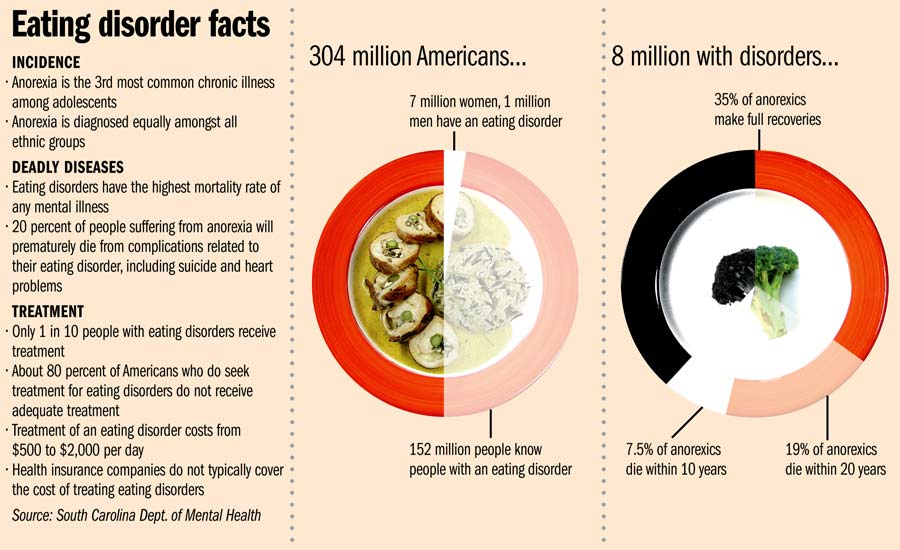Battling Eating Disorders And The Road to Recovery

“My parents spent thousands on treatment and yet I still keep gravitating toward buying laxatives and purging to achieve some sort of satisfaction,” says Nicole O’Brien, currently in her third stint of treatment at The Renfrew Center.
A new study shows about one in three women treated for eating disorders experience a relapse within two years after being discharged from the hospital. The high risk period is from six to 17 months after discharge. There are many factors that may contribute to the high number of women relapsing. Those who leave treatment and excessively exercise have severe depression about their appearance and have a history of suicide attempts may find themselves more susceptible to relapsing.
O’Brien is a 22 year-old woman who graduated from University at Albany majoring in Communications. A very sociable person, she found working for the radio show to be rewarding.
“I loved every minute of it,” she said proudly.
She grew up with her mother and father in Middletown, New York. Growing up, Nicole had been on the heavy side and at first didn’t let it bother her. Her parents were always supportive and grew up in a “typical American home; white picket fence and all that.”
In middle school, she started to notice a change in her weight.
“I was getting bigger and I started to feel self-conscious about my body just like any other girl at that age would. But then the insults started coming my way, and it made my life miserable. It didn’t help that my parents were busy working and pretended everything was ok when it wasn’t.”
When Nicole was in eighth grade, her parents told her that they were getting a divorce. After that, her mother started taking more shifts at the hospital working as a nurse to make ends meet.
“My mom barely being home pretty much set everything in motion for me to be a rebel. But I was also stuffing myself with food since I didn’t have to worry about her getting mad. I remember coming home from school one day crying because I was bullied about my weight. I knew things had to change. And I was going to whatever it took, ” she says with an edge in her voice.
Nicole started searching online on how to lose weight quickly. After exercising, experimenting with weight loss pills and eating healthier, she came across a Pro Ana website.
“The website opened my eyes to a whole different world and I wanted to become part of it.”
Pro Ana websites are created to promote anorexia. These websites were promptly shut down after news came out about the websites. Unfortunately, some are back up and running and young girls have blogs dedicated to a life with an eating disorder. Myproana.com is a popular website, with members giving each other tips on the fastest way to lose weight.
You should try the water diet. You restrict meals for as long as you can and you can only have one glass of water a day. The most days I lasted without eating was four.
If you really need to eat just take a laxative right after because it’s easier than throwing up.
Making yourself throw up might be hard at first, but trust me it gets easier after a while.
The aforementioned tips were found on numerous Pro Ana sites including Myproana.com. The girls that provide this information range from ages 14 to 21. According to the South Carolina Department of Mental Health, “95 percent of those who have eating disorders are between the ages of 12 and 25.”
“I immediately started purging since I didn’t want anyone to wonder why I wasn’t eating. So it started with constantly purging every meal I would eat. It was difficult and gross at first but you become numb to it. You just become more focus on the results. Within a week, I already lost 10 pounds. It inspired me to keep on going.”
Once Nicole started noticing a change in her body due to purging, she started to feel good in her skin. At 5’6 and weighing over 200 lbs., she dropped down to 150 lb.s within a month.
“My family and friends would question me and ask me how did I manage to do that in a month? I wasn’t going to elaborate, but I knew I needed a cover to explain this rapid weight loss. I thought maybe if I stopped purging, I could maintain my weight. I was wrong,” Nicole says.
Leaving middle school and heading to high school with a new figure gave Nicole a newfound confidence and set of friends. Her mother assumed it was a change in diet since she was always on call for work. During her freshmen year, Nicole focused on working with the newspaper and joined track to keep her occupied. Then sophomore year arrived.
“After freshmen year ended, everything changed. I managed to change my diet and maintain my weight but I was going into my first relationship. I wanted to make sure I looked good for him even though I was only 15. Around that time, I started experimenting with recreational drugs like marijuana and started drinking,” she says. “It was mostly due to peer pressure; I’m a people pleaser.”
Nicole started noticing a little weight gain due to the constant smoking and drinking and went to drastic measures to lose weight again.
“I didn’t want to go back to who I was. I wanted to be someone better. Eventually, the guy I was dating broke up with me. So I started talking to a lot of other guys and being promiscuous. Between all the drugs, alcohol and sex, that still wasn’t enough to numb me. I thought back to the satisfying feeling I would get from purging and went right back to it like an old friend.”
In the middle of her sophomore year, and all throughout high school, Nicole went back to purging, using laxatives and even restricting. She even started to work out excessively to have her friends’ figure her weight loss is due to working out and nothing else.
“If you saw Nicole through our four years in high school, she was losing weight rapidly. She was wasting away in front of our eyes and we just assumed at the time it was her need to be in the gym. A few friends and I staged a mini intervention and told her to stop working out but she wouldn’t listen,” recalls Lauren, Nicole’s best friend.
When college came around, Nicole weighed a mere 95 pounds. She was approximately more than 2o pounds underweight for her height. Eventually, her friend Lauren caught up to what was going on.
“When I went to visit her dorm room, I found a few boxes of laxatives under her bed. I thought it was strange and looked online and found my answer. I never would have thought she would do this herself,” she says.
Nicole lied to her when confronted.
“But she started asking me if I was anorexic and I started crying. It was the first time I admitted to myself that I’ve been dealing with an eating disorder. I was tired of living my life recklessly and Lauren and I called my mom and told her everything. She took me straight to the hospital the next day.”
Angry and confused, Nicole’s mother picked up her daughter and started berating her for her recklessness.
“Why would she want to do this for herself? I’ve seen cases where young girls would come in the hospital looking like skeletons and never thought my daughter would do this.
“Before admitting her to the hospital, I told my daughter to lift up her shirt so I could see her stomach and all I saw was her ribcage staring back at me. I realized that I had to do everything I could to save her. But I also started to educate myself immediately,” Nicole’s mother, Paula, said.
***
After her hospital stay, Nicole was to be admitted at The Renfrew Center in Philadelphia for inpatient treatment. Most health insurance companies for several reasons refuse to pay for the cost of treatment which results in tens of thousands of dollars spent out of pocket. This reason alone causes many with eating disorders to go without treatment.
“I was in Philadelphia for 22 days and it was an experience. At first, it was nice being with others going through what I was because I never had someone that could relate to me in that way. Over time, I started to feel guilty about putting myself here and didn’t take treatment as seriously as I should have,” Nicole mentions.
After Philadelphia, she was required to go to the Ridgewood, New Jersey location for DTP (Day Treatment Program) followed by IOP (Intensive Outpatient Program). DTP is five days a week and the patients are required to have two meals there. The meal is designed to the patient’s specific meal plan and helps the patients to be more comfortable with eating with others. The programs begin at nine in the morning and ends at two thirty in the afternoon. During this time, you speak with nutritionist, therapist and psychiatrist. Aside from the breakfast and lunch being provided, there are several groups that teach the women how to deal with certain issues that accompany the recovery of an eating disorder. IOP is only three times a week from twelve to three in the afternoon. Lunch is provided and several groups are offered. You may always consults with the doctors on call.
“The four months spent at treatment were a waste. I didn’t take it seriously at all. The first thing I did when I was officially discharged was buy laxatives,” Nicole says.
After relapsing within a month of being discharged, her family was distraught and urged her to go back to Philadelphia when she finishes her semester at school. Nicole took two semesters off to focus on recovery and eventually took online classes.
“A few months after I was discharged, I was right back in Philadelphia. I tried to utilize the tools given to me but it wasn’t easy. That’s when we met; when I was in treatment that second time around,” Nicole says.
I nod, remembering the moment when I first when to treatment back in June of this year. Nicole was the first one to tell me all about treatment and we became instant friends.
A nutritionist at The Renfrew Center in Ridgewood, Dr. Jenna McCormick, commented how difficult it is for the women to adapt to the meal plan and completely give up their eating disorder.
“I’ve seen several girls cycle through here and it pains me to see that happen. Since eating disorders are a mental health issue, it can be quite hard to get through to them to tell these women that they are damaging their body. A lot of these girls have suffered hair loss, fatigue, tooth decay, low blood pressure and countless other physical effects. They disregard the physical effects because they’re numb to it”.
Dr. Kim, who is a licensed psychiatrist at The Renfrew Center, mentions that “most of our patients suffered from severe depression and anxiety. They have a distorted view of their body and end up withdrawing socially to focus on losing weight. They ‘want to feel accepted’ is what I hear from most girls”.
“I reached my lowest weight this year. I finally reached 88 lbs., but of course that got me sent straight to Renfrew in Philadelphia again,” Nicole mentions. “I got out of inpatient a week ago and heading to Ridgewood next week. I’ve gained fifteen pounds, which I’m still struggling with accepting that fact. This time, I actually want things to change. I’ve changed my whole family’s life because of this. I hate that I had to relapse for the second time to realize that but hopefully things change this time around.”
Her mother still questions how she puts up with it all. “I didn’t think she would ever have to go back a third time let alone a second. But I’m not giving up on Nicole. I know she can do this and I realized that after years of distorted eating, it’s going to take just as long for her to get better.”
“I have a lot of things I would like to accomplish and hopefully that’s beating this eating disorder. I would love to finally move out on my own or partake in activities that won’t injure my body. The first two times in treatment were not taking seriously because I wasn’t ready. I just wasn’t ready to let go of the lifestyle. I lived for my eating disorder; everything I did was for my eating disorder. It was my best friend for a time in my life and I want to change that so desperately. I’m drained in every sense of the word. I can’t live like this anymore. I would love to be a healthy weight and actually feel comfortable with my body for once,” Nicole tells me, about to break down.
I try to comfort her, because I understand her pain all too well.
There are several ways to prevent a relapse from becoming full blown, turning into weeks and months. Some websites recommend that the person immediately contact a therapist or other health professional to get them back on track. It’s important to stick to your meal plan, give oneself constant positive affirmative and realize that a slipup in recovery does not signify the end of the world. You can recover from this serious illness.
This reminds me when I first relapsed and how I thought I wouldn’t. A month after being discharged and I headed back into restricting and purging. What started as a minor slip up turned into two months of disregarding everything I learned in treatment.
Luckily for those being discharged from treatment, there are many workshops and support groups dedicated to those in recovery. The Renfrew Center constantly conducts workshops to educate ourselves on the road to recovery. Also, several support groups are offered by looking up online.
“I’m looking forward to changing my life. Third time’s the charm as they say. I feel more confident now than I did during my other times in treatment,” Nicole says, staring off.
“I’ve met so many courageous women that have provided me with insightful advice that I will use this time around. Sometimes, I would think I was a failure since I remember there were girls in treatment that were way younger than me. I didn’t understand why they were able to make it through and I couldn’t at the time. It’s just reminding yourself that everyone is different.”
Lauren has stood by Nicole and will continue to support her on her third stint in treatment. “I can’t imagine how hard it must be for someone to let go of this addiction but I have faith in her that she can do it.”
The other patients in treatment understand how hard it is to let go of an eating disorder and having to start over again. One patient, Kristen, who has suffered from anorexia for five years, mentions how “letting go of my anorexia was the biggest decision I had to make. I’m glad I did because now I’ve learned to enjoy life again. I know it’s going to be difficult moving forward, but I’m ready.”
As Nicole leaves her treatment at 2:30 p.m. on a Friday, I asked her how it went.
“Not too bad. But I will not order another veggie burger again,” she exclaims.
Sitting across from Nicole at the Ridgewood Coffee Company, you could tell there’s a determination in her eyes that wasn’t there when we first met.
“It’s my second day here in Ridgewood and I’m already dreading the drive to Middletown. I’m happy I’m here though; I’ve already met some amazing women,” Nicole says determined. “I’m hopeful this time things will change”

Jersey girl.
Enjoys films festivals and spends most of my time playing World of Warcraft.Music enthusiast.
She currently writes the column...







